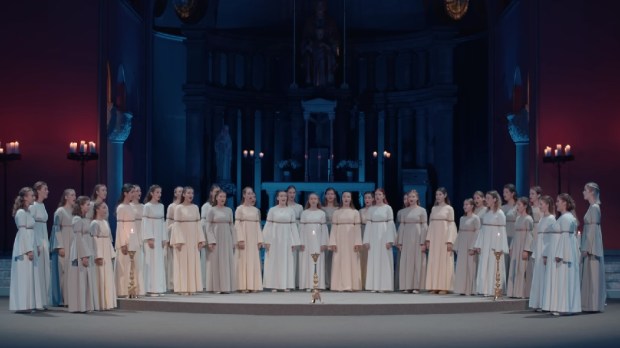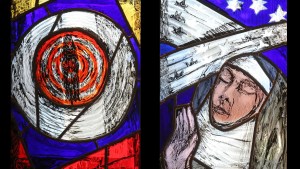It’s just hard to find music that is as touching as those songs that were composed by saints. Today we’re listening to a medieval hymn from a patron saint of musicians and writers: the esteemed Doctor of the Church, St. Hildegard von Bingen.
Active in the 12th century, St. Hildegard was a Renaissance woman before the Renaissance ever started. A polymath – meaning she had a wide range of expertise – St. Hildegard was influential in the fields of writing, philosophy, mysticism, and medicine. The musical says Hamilton was writing like he was running out of time, but St. Hildegard may have him beat with three great volumes of visionary theology, as well as another two volumes of material on natural medicine and healing; an innovative alternative alphabet (which inspired Tolkien’s elvish language); and 400 letters of her correspondence with popes, emperors, abbots, and more.
Somewhere along the way, this Benedictine nun also found time to compose some 69 musical works, making her one of the most prolific composers of her era. The majority of these pieces were liturgical — hymns or settings of the Mass or the texts of the Divine Office – and among them is “De Spiritu Sancto.”
In the tune St. Hildegard appears to be praising the Lord for all of creation. The English translation of the Latin lyrics reads:
Holy spirit, making life alive,
moving in all things, root of all created being,
cleansing the cosmos of every impurity, effacing guilt,
anointing wounds.
You are lustrous and praiseworthy life,
You waken and re-awaken everything that is.
This rendition, recorded by the St. Stanislav Girls’ Choir of the Diocesan Classical Gymnasium, is notable for the excellent vocal work that the choir puts on. As an added bonus, the choir is supported by a quartet of musicians playing on genuine medieval-era instruments. These include the recorder, fidel, Gothic harp, and a rarely heard instrument called the hurdy-gurdy.
The hurdy-gurdy, along with being a fun word to say, is an instrument that works sort of like an organ grinder’s, with a hand-crank that turns a rosined wheel to rub against the strings. The resulting sound produces a drone, the pitch of which can be controlled by buttons on the side. It seems like a fun instrument to learn how to play, although in the video it is being played by one of the most seemingly humorless men we’ve ever seen.
Hear more fine choral works from the St. Stanislav Girls’ Choir at the YouTube channel of zevnikov.



